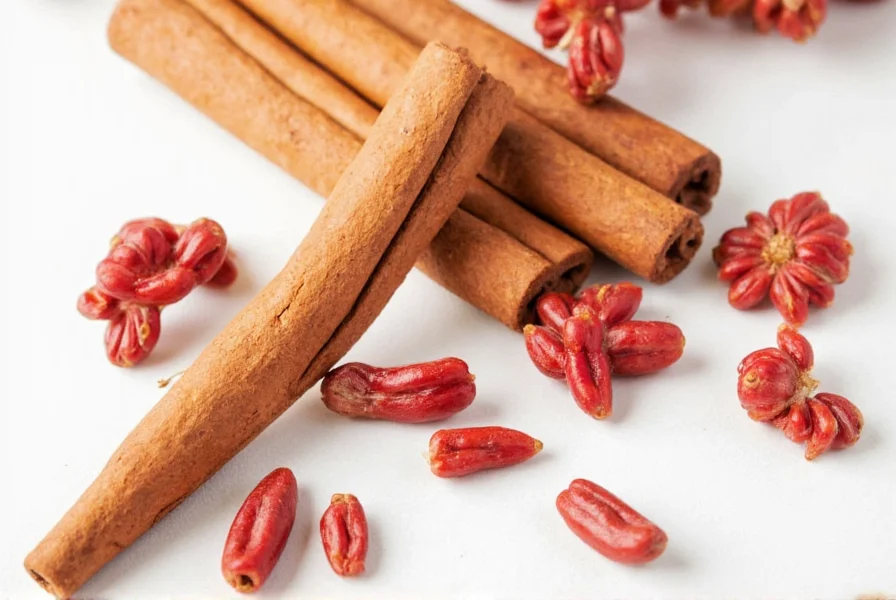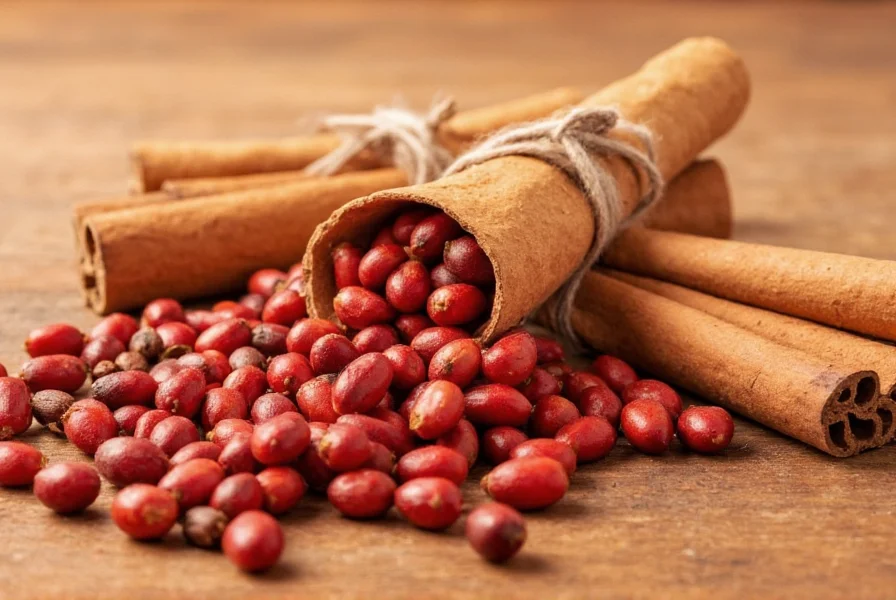Berberine and cinnamon have gained attention in natural health circles for their potential metabolic benefits. This comprehensive analysis examines the scientific evidence behind these compounds, their individual and combined effects, and practical considerations for safe usage.
The Science Behind Berberine
Berberine is a bioactive alkaloid compound found in plants including goldenseal, barberry, and Oregon grape. Research shows berberine works through multiple pathways to support metabolic health:
- Activates AMP-activated protein kinase (AMPK), often called the "metabolic master switch"
- Improves insulin sensitivity in muscle and liver tissue
- May reduce glucose production in the liver
- Supports healthy lipid metabolism
A 2020 Metabolism journal review analyzed 14 clinical trials involving 1,068 participants. The analysis concluded berberine demonstrated comparable efficacy to metformin for blood glucose control in type 2 diabetes, with HbA1c reductions averaging 0.7-1.0%.

Understanding Cinnamon's Metabolic Effects
Not all cinnamon is created equal. Two primary varieties exist:
| Type | Scientific Name | Coumarin Content | Recommended for Regular Use |
|---|---|---|---|
| Ceylon Cinnamon | Cinnamomum verum | Very low (0.004-0.13%) | Yes - safer for regular consumption |
| Cassia Cinnamon | Cinnamomum cassia | High (2.15-6.97%) | Limited use due to coumarin concerns |
Ceylon cinnamon, often called "true cinnamon," is preferred for regular supplementation due to its significantly lower coumarin content. Coumarin, found in higher concentrations in Cassia cinnamon, can cause liver toxicity in sensitive individuals when consumed in large amounts over time.
The active compounds in cinnamon, particularly cinnamaldehyde and polyphenols, appear to enhance insulin signaling and glucose uptake. A 2019 meta-analysis in Nutrition Journal reviewed 16 studies and found cinnamon supplementation significantly reduced fasting blood glucose by an average of 24.59 mg/dL.
Synergistic Potential of Berberine and Cinnamon Combination
While limited research specifically examines berberine and cinnamon used together, their complementary mechanisms suggest potential synergy:
- Complementary pathways: Berberine primarily works through AMPK activation, while cinnamon's compounds enhance insulin receptor function
- Extended duration of effect: Berberine has a longer half-life than cinnamon compounds, potentially providing sustained support
- Reduced dosage requirements: Combination may allow lower individual doses while maintaining efficacy
A 2021 pilot study published in Complementary Therapies in Medicine investigated a berberine-cinnamon combination in 45 prediabetic adults. The combination group showed greater improvements in postprandial glucose levels compared to either compound alone, though the study was limited by small sample size.
Evidence-Based Health Benefits
Research supports several potential health benefits of berberine and cinnamon:
Blood Sugar Management
Both compounds demonstrate clinically relevant effects on glucose metabolism. Berberine typically reduces fasting glucose by 15-20 mg/dL and HbA1c by 0.7-1.0% in type 2 diabetes. Cinnamon shows more modest effects, with fasting glucose reductions of 10-25 mg/dL in clinical studies.
Cardiovascular Support
Berberine has demonstrated lipid-lowering effects, reducing LDL cholesterol by 20-25 mg/dL and triglycerides by 25-35 mg/dL in multiple studies. Cinnamon shows more modest effects on lipid profiles but may improve endothelial function.
Anti-Inflammatory Properties
Both compounds exhibit anti-inflammatory effects through different pathways. Berberine inhibits NF-kB signaling, while cinnamon's polyphenols reduce inflammatory cytokines.
Safety Considerations and Potential Interactions
While generally well-tolerated, berberine and cinnamon require careful consideration:
- Hypoglycemia risk: Both compounds can lower blood sugar significantly, especially when combined with diabetes medications
- Gastrointestinal effects: Berberine may cause digestive discomfort in some individuals
- Coumarin concerns: Cassia cinnamon contains higher coumarin levels that may affect liver function with prolonged high-dose use
- Pregnancy considerations: Berberine is not recommended during pregnancy due to potential uterine stimulation
A 2022 safety review in Phytotherapy Research noted berberine's potential interactions with CYP3A4-metabolized drugs, including some statins and blood pressure medications. Always consult with a healthcare provider before combining these supplements with prescription medications.

Practical Usage Guidelines
For those considering berberine and cinnamon supplementation:
- Start with individual compounds: Assess tolerance to each separately before combining
- Choose quality sources: Select standardized berberine extracts (typically 97% berberine hydrochloride) and Ceylon cinnamon
- Dosing considerations: Typical berberine doses range from 900-1500 mg daily in divided doses; cinnamon doses range from 1-6 grams daily
- Timing matters: Take berberine with meals for optimal blood sugar effects; cinnamon can be taken with or between meals
- Monitor response: Track blood glucose levels if using for metabolic support
Research suggests taking berberine in divided doses (typically 500 mg three times daily) with meals provides optimal blood concentration. Cinnamon can be incorporated through supplements or culinary use, with Ceylon variety preferred for regular consumption.
Who Might Benefit Most
These natural compounds may be particularly beneficial for:
- Individuals with prediabetes or metabolic syndrome
- Those seeking natural approaches to support healthy blood sugar levels
- People with PCOS (polycystic ovary syndrome) who often experience insulin resistance
- Individuals looking for complementary approaches to cardiovascular support
However, they should not replace conventional medical treatment for diagnosed conditions. Always work with a healthcare provider to determine if these supplements are appropriate for your specific health situation.
Limitations of Current Research
While promising, research on berberine and cinnamon has limitations:
- Most studies are relatively short-term (8-12 weeks)
- Long-term safety data is limited, especially for combination use
- Optimal dosing ratios for combined use haven't been established
- Individual responses vary significantly based on genetics and health status
The scientific community calls for more rigorous, long-term studies examining the specific combination of berberine and cinnamon for metabolic health support.
Conclusion
Berberine and cinnamon represent promising natural compounds with research-supported benefits for metabolic health. While evidence for their combined use is still emerging, their complementary mechanisms suggest potential synergy for blood sugar management and related metabolic parameters. As with any supplement regimen, individual responses vary, and professional medical guidance is essential, particularly for those with existing health conditions or taking medications. Future research will provide clearer insights into optimal usage protocols for this potentially beneficial combination.
Frequently Asked Questions
Can berberine and cinnamon be taken together safely?
Yes, berberine and cinnamon can generally be taken together safely for most people, but with important considerations. Both compounds lower blood sugar, so combining them may increase hypoglycemia risk, especially if you're taking diabetes medications. Start with lower doses of each, monitor your blood sugar levels, and consult your healthcare provider before combining them, particularly if you have diabetes or take medications that affect blood glucose.
How long does it take to see results from berberine and cinnamon?
Most clinical studies show measurable effects on blood sugar markers within 4-8 weeks of consistent use. Berberine typically demonstrates effects on fasting glucose within 2-4 weeks, with HbA1c improvements becoming apparent after 8-12 weeks. Cinnamon may show more gradual effects, with significant changes in glucose metabolism typically observed after 6-12 weeks of regular use. Individual results vary based on baseline health status, dosage, and consistency of use.
What's the difference between Ceylon and Cassia cinnamon for blood sugar support?
Both Ceylon and Cassia cinnamon varieties offer potential blood sugar benefits, but Ceylon cinnamon (Cinnamomum verum) is generally preferred for regular supplementation due to its significantly lower coumarin content. Cassia cinnamon contains higher levels of coumarin, which can cause liver toxicity in sensitive individuals with prolonged high-dose use. Research suggests similar glucose-lowering effects between varieties, but Ceylon's safety profile makes it the better choice for ongoing use. Look for "Ceylon" or "true cinnamon" on supplement labels.
Can berberine and cinnamon replace diabetes medication?
No, berberine and cinnamon should not replace prescribed diabetes medications without explicit guidance from your healthcare provider. While research shows these compounds can significantly improve blood sugar markers, they are not substitutes for medication in diagnosed diabetes. Some people may be able to reduce medication doses under medical supervision when using these supplements, but never discontinue or alter prescribed medications without consulting your doctor. These natural compounds work best as complementary approaches within a comprehensive diabetes management plan.
Are there specific tests to monitor when taking berberine and cinnamon?
If using berberine and cinnamon for blood sugar support, regular monitoring of fasting glucose, postprandial glucose, and HbA1c is recommended. Those with liver concerns should consider periodic liver enzyme tests, especially when using Cassia cinnamon regularly. Individuals taking medications metabolized by CYP3A4 enzymes (like some statins) may benefit from medication level monitoring. Always discuss appropriate testing with your healthcare provider based on your individual health profile and any medications you're taking.











 浙公网安备
33010002000092号
浙公网安备
33010002000092号 浙B2-20120091-4
浙B2-20120091-4